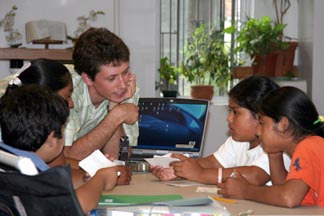Cornell Urban Scholars Program: Doing well while doing good
By Brendia Tobias

NEW YORK -- In New York's City Hall July 27, under the approving gaze of the statue of Thomas Jefferson, Cornell University undergraduate Aaron Skinner '06 spoke of his eight weeks working at Covenant House's mother-child unit. He spoke to fellow interns in the Cornell Urban Scholars Program (CUSP) and their supervisors at a recognition reception in City Council chambers.
During his internship, Skinner led workshops to address the competing stressors of caring for children while attending school and also provided case management at the 30-day transitional living shelter for homeless mothers and their children, the first such facility in the city. In evaluating the program and his experience, Skinner remarked, "I expected to be told what to do, and ended by learning that I had to use my analytical skills to understand what needed to be done and then take action."
Skinner was one of 26 undergraduate and 10 graduate CUSP students who took part in an eight-week paid internship this summer at 32 organizations, among them some of the city's most innovative nonprofits. Interns increased their understanding of the causes of poverty and what's being done to ease its problems by the agencies that serve the poor. Cornell students were interns with such agencies as the Center for Urban Pedagogy, which promotes art and design to catalyze democracy and civic participation; the Randall's Island Sports Foundation, which is rebuilding the urban island's Robert Moses playing fields; and Added Value, a youth empowerment project that promotes the sustainable development of Red Hook (Brooklyn) by nurturing a new generation of young leaders. Other CUSP students were interns with other groups and organizations like Cornell Cooperative Extension, Weill Cornell Medical College and the New York City Council. In a show of overwhelming appreciation, supervisors from all participating agencies were in attendance.
This summer marked the fourth "class" of CUSP interns. At the recognition ceremony, CUSP co-director Kenneth M. Reardon, associate professor and chair of city and regional planning at Cornell's College of Architecture, Art and Planning (AAP), noted that "an astounding 65 percent of the program's alumni are either currently engaged in public service work or preparing to do so through appropriate graduate education." This year CUSP has added a graduate research fellowship and an optional course, CRP 332 (Urban Research Seminar), offered in the fall semester to assist students in producing a publishable policy paper based on their internship.
CUSP was founded by Reardon following a challenge to Cornell by Howard G. (Peter) Sloane, chairman of the board of the Heckscher Foundation for Children, to establish a program that would increase the number of students dedicated to working with public-service organizations in New York City. Said Reardon, "This program was designed to encourage Cornell undergraduates to enhance their understanding not just of the cases of urban social inequality, but also the contributions that New York City's nonprofit organizations were making to address the human consequences of persistent poverty."
Following Reardon's remarks, New York City Council Member Gale A. Brewer, a Democrat who represents part of the city's Upper West Side, spoke of the accomplishments of her intern, Katherine Miller '06, as well as the energy and commitment of all CUSP students. Brewer explained that CUSP has become an indelible part of her professional consciousness. She was with two Cornell urban scholars in the council's chambers on July 23, 2003, the day Council Member James E. Davis was gunned down on the balcony, she told the audience. The 2003 CUSP reception was held that evening, and together Brewer and the interns attended the event, shaken but in solidarity.
Both Reardon and Susan H. Murphy, Cornell vice president for student and academic services, remarked how fitting it was that Cornell, the land-grant university of New York state, would be committed to a venture such as CUSP. Murphy noted the symbiotic relationship between Cornell's land-grant mission and the dedication to service that is now a part of the urban scholars' Cornell experience.
Leonardo Vargas-Mendez, executive director of the Cornell Public Service Center and a co-director of CUSP, and W. Stanley Taft Jr., associate dean of AAP and associate professor of art, concluded the evening by distributing certificates to students and supervisors under a fresco with these words of Jefferson: "Equal and exact justice to all men, of whatever state or persuasion."
CUSP participants and guests spent part of the evening mingling in the historic rotunda on the second floor of City Hall, the grand marble stairway descending below them. Students snacked on hors d'oeuvres and chatted with their supervisors before adjourning to City Council chambers.
Media Contact
Get Cornell news delivered right to your inbox.
Subscribe